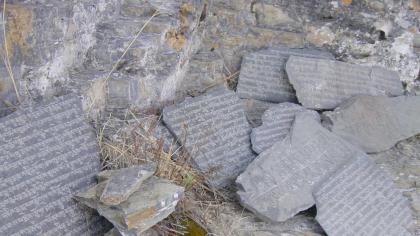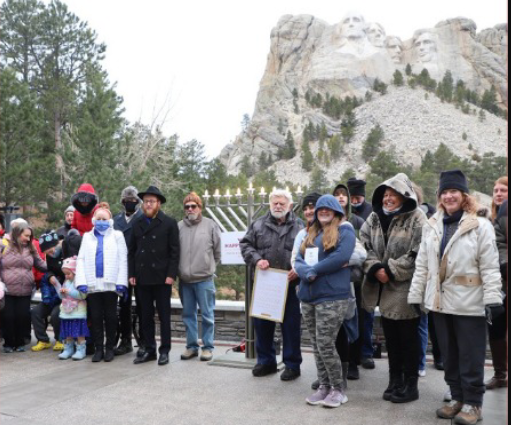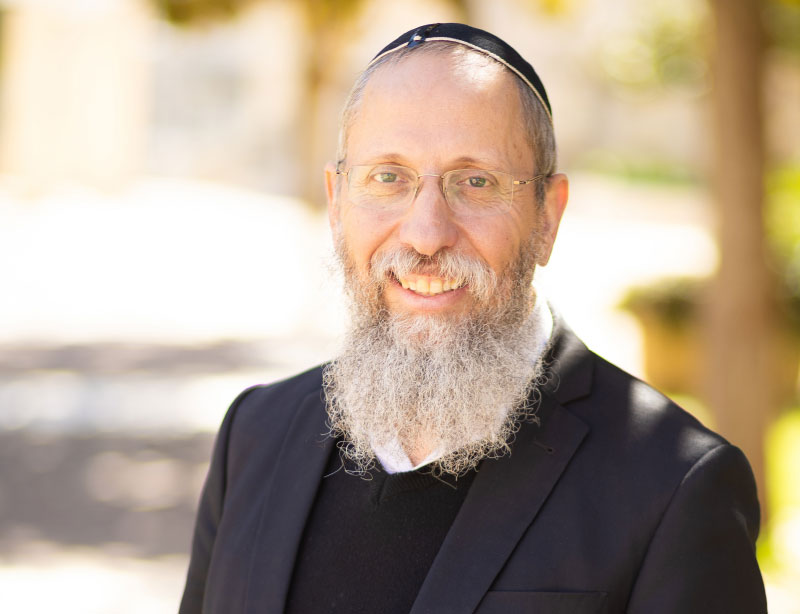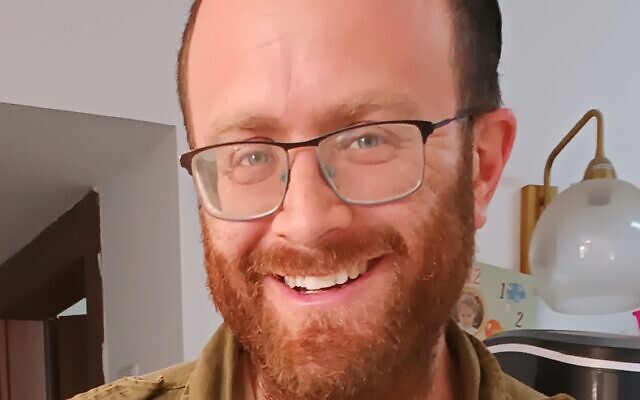September 23, 2024|כ' אלול ה' אלפים תשפ"ד Ki Tavo 5784: Did Our Tefillos Fail Last Year? Approaching Rosh Hashana After a Difficult Year
Print ArticleThere is only about a week and a half until Rosh Hashana. And typically, during this time, I begin to close myself in my office and consider what messages I want to share over these important days.
But this year, I have continued to think about a question that many of us may have already been thinking about and will likely think about in some way on Rosh Hashana. And that is: Did our tefillos fail last year during the Yamim Noraim?
The Yamim Noraim season concludes, to a certain extent, on Hoshana Raba, and the next day is Shemini Atzeres/Simchas Torah. And it was, of course, on that day last year that Am Yisrael experienced the greatest tragedy since the Holocaust.
I have heard other rabbis mention that they have received this question from their members. Some rabbinic organizations have had conversations on this topic.
And while I don’t believe I can offer a satisfactory, or in any way correct answer to the SPECIFIC question, I believe that through an exploration of the question, we can begin thinking for ourselves about how we will approach Rosh Hashana this year. Special thanks to Rabbi Mordechai Torcyzner for a number of the sources on this topic.
I want to share three thoughts to consider.
#1 – It could be that the premise of the question itself is not entirely correct.
The Gemara in Rosh Hashana 16b notes:
"ג' דברים מזכירין עוונותיו של אדם" והאחד מהם עיון תפילה.
There are three items that bring to the fore the sins of a person. Meaning, things that someone should NOT do. One of them is “IYUN TEFILLAH”.
Tosfos there explains that this refers to a person who tries so hard to daven and then expects that because he or she has done so that Hashem is guaranteed to answer. The gemara is stating clearly that this is not the correct approach.
Rav Soloveitchik writes that we refer to Hashem as a SHOMEIA TEFILLAH, One who hears our tefillos. That does not necessarily mean that He will answer in the way we had hoped, even if the tefillah is incredibly powerful and entirely sincere.
In fact, Rav Schachter writes in Nefesh HaRav that Rav Soloveitchik was opposed to the language that many use when reciting a Mishebeirach for those who are sick:
"בעבור שכל הקהל מתפללים בעבורו"
"That the person should be healed BECAUSE all of us daven on their behalf.”
We hope and pray that Hashem will respond to our tefillos, and of course, we know that so often He does. But we have no guarantee that it will happen just because we asked. And therefore, it is fair to argue that even if we davened the most powerful tefillos of our lives last year, Hashem could have still decided to do what He did.
#2 – Tefillah should never be viewed as ALL or NOTHING
Rav Mayer Twersky shlit”a was asked recently about this same question, and he noted that we should never view tefillah as an all or nothing proposition.
We don’t need to recount the horrific and terrifying tragedy of last Simchas Torah and the months that ensued. At the same time, we all know the stories of incredible miracles that have occurred to so many people. Yes, of course, so many families did NOT experience miracles, and their tefillos were NOT answered, but that does not mean that there weren’t many many tefillos that were answered in the affirmative.
Rav Yaakov Yisrael Kanievsky zt”l, also known as the Steipler Gaon, [the brother-in-law of the Chazon Ish, and the father of Rav Chaim Kanievsky] was once asked about what happens to the tefillos we daven for someone who is sick and did not recover. Does it mean those tefillos were said in vain?
He responded that to believe the tefillos had no impact is absolutely a MISTAKE. We never know, he said, all the different ways in which our tefillos have an impact. They may have eased the suffering of the patient. They may have extended his or her life even a small amount. The tefillos may have created as merit for the person even after their death because it was on their account that you decided to turn to Hashem in tefillah. And then he concluded by stating the following: We will never know, until the time of Mashiach, the power our tefillos may have to help all kinds of people in all kinds of difficulty. Even a tefillah that we davened for a particular individual, he writes, can have an impact on others in ways we can never fully appreciate.
#3 – The question itself should call upon us to rediscover the real goal of Tefillah all year round, and certainly on the Yamim Noraim.
In Ein Aya, Rav Avraham Yitzchak HaKohein Kook zt“l writes that, of course, TEFILLAH on its own, is NEVER ONLY about speaking in a sincere way to Hashem.
Rather, the tefillah we daven IN SHUL should be a catalyst for our growth OUTSIDE OF SHUL. It is the COMBINATION of sincere Tefillah COMBINED with our growth in our ACTIONS that we hope can be Maavirin Es Roa HaGazeira.
Rav Kook writes that the true goal of Tefillah is:
שיוציא האדם שלמותו מן הכח אל הפועל
To inspire us to realize our true potential.
And he writes that it has the power to do so within the following general framework:
Hashem created a world in which we all have needs. And because of the needs we have, we are stimulated to turn to Him in Tefillah. The more we daven, the more we come face-to-face with reminders that HKBH controls the world, and that we are dependent on Him for everything. And the more we have that awareness, the more we will come to express that awareness in our everyday lives, in improving the types of people we are, and in terms of our shemiras hamitzvos.
Rav Shimshon Raphael Hirsch explains that the word to daven, להתפלל, has the shoresh פלל, which means to judge, and it is reflexive, something one does to oneself. And he explains that to daven, is to judge oneself. As we go through the siddur and we encounter the values that make up a Torah life, we ask ourselves, we consider whether we are living up to our potential.
But the truth is, that this idea isn’t new to Rav Kook or Rav Hirsch.
In Parshas Breishis, when Kayin brings a Korban to Hashem and it is REJECTED, Hashem tells him:
הֲל֤וֹא אִם־תֵּיטִיב֙ שְׂאֵ֔ת
Yes, I haven’t accepted your sacrifice, but if you improve your character, then there is hope.
Yeshayahu HaNavi tells Am Yisrael:
החפץ ה' בעולות וזבחים כשמוע בקול ה'
Does Hashem want your service of Korbanos? No, He wants you to listen to His mitzvos!
In other words, as I heard Rabbi Mordechai Torczyner put it recently, “the point of davening is not to request a better lot. It is to create a better us, which will then hopefully help us create a better lot.”
But this last point is a difficult one. Because to SAY I believe, to EXPRESS our commitment and dependency on Hashem through tefillah is one thing. To show it each day OUTSIDE of shul is much more challenging.
But that, of course, is what Rosh Hashana calls upon us to do: U’Teshuva, U’Tefillah, U’Tzedaka Maavirin Es Roa HaGzeira. It is through our commitment to Tefillah, but ALSO our commitment to being more committed Jews, that has the potential, at least, to make an impact in the world.
There was a young man from the New York area who went to learn in Eretz Yisrael. He became very attached to Eretz Yisrael and decided to enroll in a Hesder Yeshiva, and eventually rose to a position of leadership in the IDF. In the summer of 2005, the Israeli government decided to evacuate Gaza and offer it to the Palestinian Authority. The IDF would be charged with the task of forcibly removing the Jewish residents of Gush Katif and the surrounding areas from their homes.
The American student was very distraught about the assignment. He felt it was the wrong thing to do; but as a solider he followed orders and participated in the forced evacuation.
His unit arrived at a certain yishuv in Gaza. It was his job to see to it that everyone boarded the buses to be evacuated. He worked with the Rabbi of the yishuv. Everyone gathered in the town's shul, the Rabbi spoke, the soldier spoke, they all cried and finally they all filed out of the shul and boarded the bus. After everyone had evacuated the building, the soldier took out a siddur from his backpack.
He kneeled down on the ground, dug a hole, and buried his siddur. The Rav asked him why he did such a thing. The soldier replied that maybe a year from now or 5 years from now or 50 years from now, we will come back to this place, people will rebuild here and maybe they will find this siddur. And if they do so they will realize that we left our hearts and prayers behind in this place.
Fast forward 11 months to the summer of 2006. Gilad Shalit had been kidnapped by Hamas, and Israel decided to invade Gaza in an attempt to find him.
The unit of this American soldier was sent back into Gaza to set up a camp as a base of operations. They entered Gaza under the cover of darkness. They did not know exactly where they were, but they stopped at a certain deserted place to set up camp. The next morning, the soldier looked around. He was totally disoriented.
He did not really know where he was, but he just had this feeling that he should look for his siddur. He knelt down on the ground and started digging, and he found the siddur.
He was so shaken by what had happened, and he called his Rav to ask for advice. The family’s Rav, Rabbi Aryeh Lev Ginsberg was astounded, and could not bring himself to interpret the meaning of the story.
However, he arranged a meeting between the soldier and Rav Chaim Kanievsky, one of the greatest Talmidei Chachamim living in Eretz Yisrael.
Rav Chaim asked him, "What did you do when you knew you were going to need to evict the Jews of Gush Katif?"
The soldier replied, "I went to my commanding officer, and I went up the chain of command trying to convince everyone that it was a mistake and that we should not go ahead with the operation."
"What else did you do?" persisted Rav Chaim.
“I davened to HKBH that it should not happen and that He should please show Mercy.”
Rav Chaim then asked, "So when it happened, and you had to evict them, so what did you do then?"
The soldier responded, "At that point I stopped davening for it to not happen. It was over."
Rav Chaim responded to him: HKBH is sending you a message: “Never stop davening! You buried the siddur because you felt it was futile to daven anymore. G-d caused you to find it so that you would realize that it is never too late to daven! "All is lost?" G-d tells you: "No. All is not lost. Pick up your siddur and daven again!”
Now, in the month of Elul, we are saying the tefillah of L’David Hashem Ori (Tehillim 100) two times each day. In the last line of that tefillah we say:
“Kavei El Hashem, Chazak V’Ametz Libecha, V’Kavei el Hashem.” Hope in God, strengthen your heart, and then hope in God. Why the repetition? Explains the גמ' in Brachos 35: When a person davens and sees that their tefillah has not been answered. Pick up the siddur and daven again. B/c we never know the impact of our tefillos.
Did we fail last year during the Yamim Noraim? I just don’t know the answer. No one does. But what I DO BELIEVE, very strongly, is that Hashem is waiting for us this year to RESPOND like never before.
And that response comes with a renewed commitment to what Tefillah is SUPPOSED TO BE. A Tefillah that yes, we hope, and IY”H, will be answered fully. But also a tefillah that connects us back to Hashem. A Tefillah that reminds us of who we CAN BE. A Tefillah that allows us to realize just HOW RELIANT WE ARE ON HKBH and inspires us to lead lives more committed to Him than ever before.




